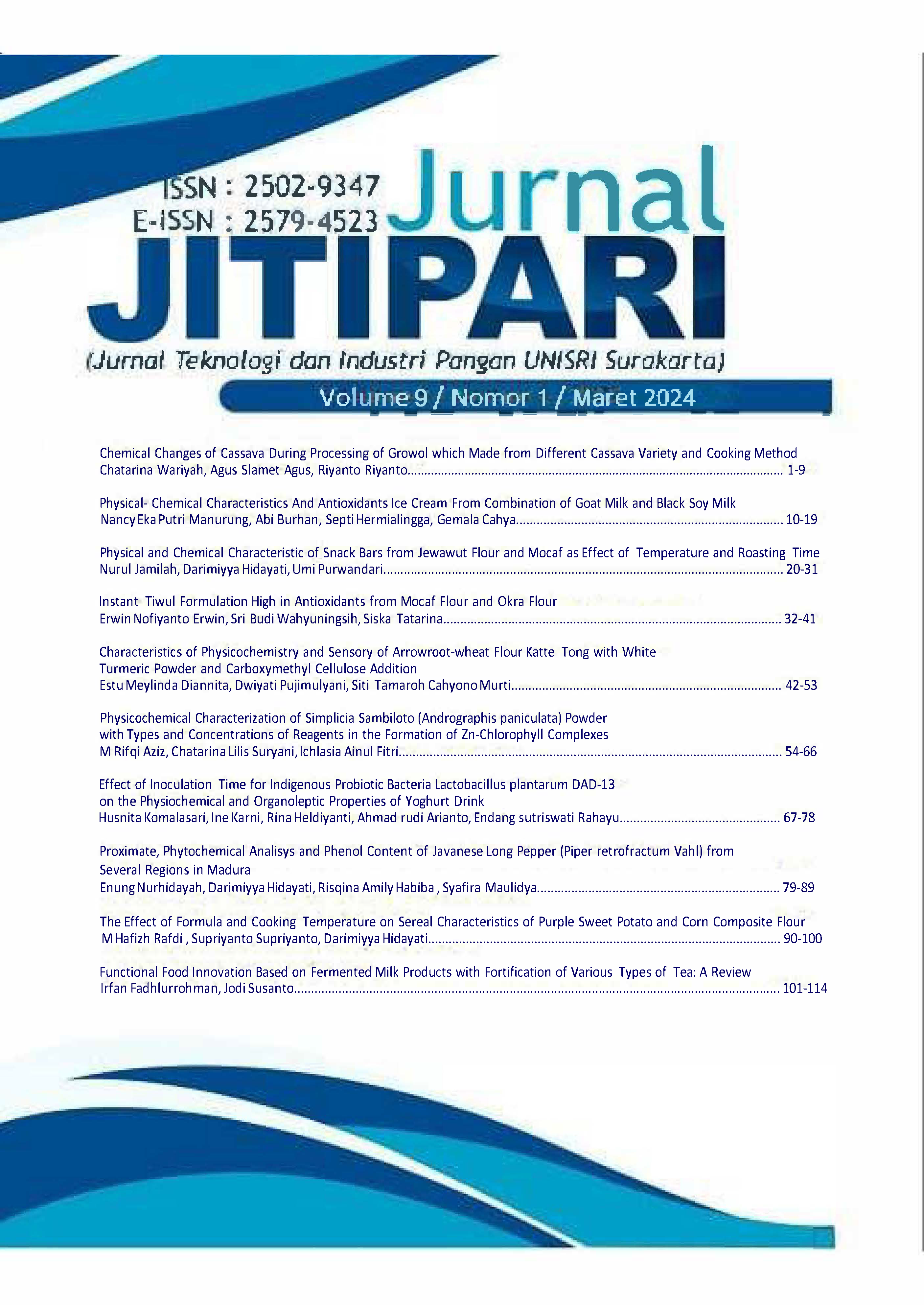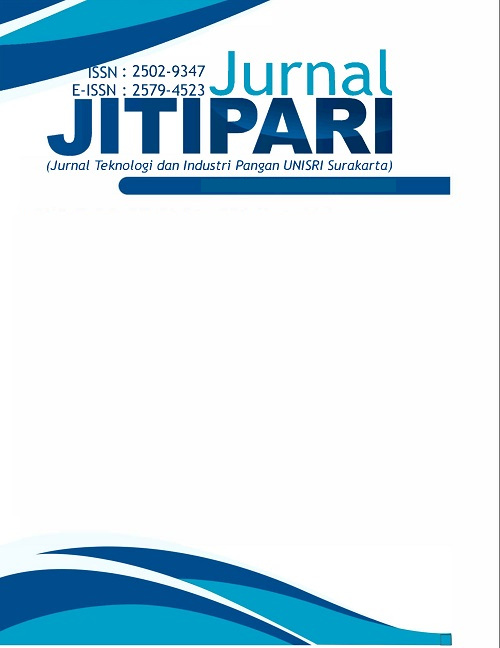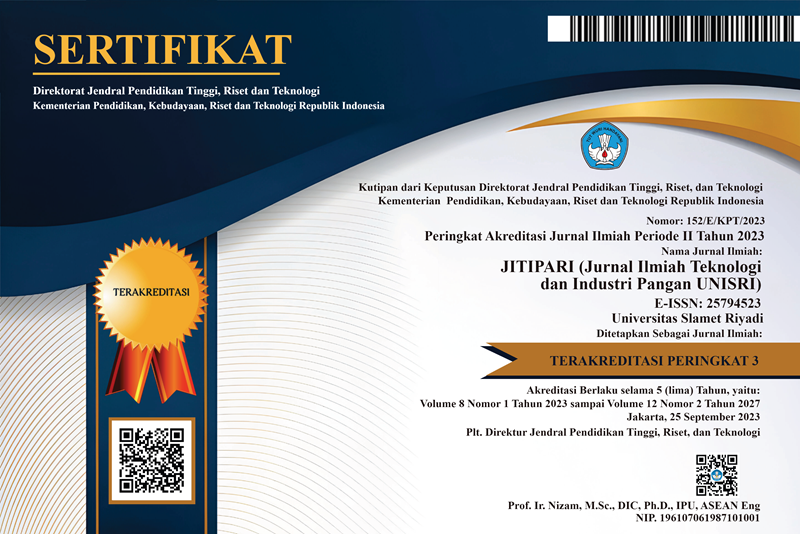Instant Tiwul Formulation High in Antioxidants from Mocaf Flour and Okra Flour
Formulasi Tiwul Instan Tinggi Antioksidan dari Tepung Mocaf dan Tepung Okra
DOI:
https://doi.org/10.33061/jitipari.v9i1.10131Abstract
Tiwul is a traditional food source of carbohydrates made from traditionally processed cassava, which is used as a substitute for rice. This research aimed to determine the effect of adding mocaf flour and okra flour (Abelmoschus esculentus) on the chemical and antioxidant properties of instant tiwul. The research method used an experimental design, namely a one-factor Completely Randomized Design (CRD), with treatment comparison between mocaf flour and okra flour (100:0, 85:15, 75:25, 65:35). Each treatment was repeated 4 times. The variables observed were air content, ash, fat, protein, carbohydrates, antioxidants, and preference tests. The data obtained was described as diverse, and if there were differences between treatments, then it was tested further using the Duncan Multiple Range Test (DMRT) at the 5% level. The research results of instant tiwul with the addition of 85% mocaf flour and 15% okra flour formulation were instant tiwul with the best treatment in chemical testing and liked by consumers. The selected instant tiwul had an air content of 2.46%, ash content of 2.05%, fat content of 0.32%, protein content of 3.93%, carbohydrates of 81.25%, and antioxidant activity of 81.25%. The tiwul formulation from mocaf flour and okra flour can fulfill the requirements for instant tiwul.
References
Agustia, F. C., Rukmini, H. S., & Naufalin, R. (2018). Formulasi tiwul instan tinggi protein dari tepung ubi kayu yang disubstitusi tepung koro pedang dan susu skim. Jurnal Aplikasi Teknologi Pangan, 7(1), 15-20 https://doi.org/10.17728/jatp.2132
Akale, A. H., & Alemu, M. W. (2019). Current distribution, regeneration and management practice of Hagenia abyssinica in different agroforestry systems of Ethiopia: A review. International Journal of Biodiversity and Conservation, 11(9), 266-271 https://doi.org/10.5897/ijbc2019.1294
AOAC. (2012). Official methods of analysis of the association of analitycal chemist. Association of Official Analitycal Chemist, Inc, 1(1).
Arwin, A. (2018). Kajian penilaian organoleptik dan nilai gizi snack bar berbasis tepung beras merah dan kacang merah (Phaseolus vulgaris L.) sebagai makanan selingan yang berserat tinggi. Jurnal Sains Dan Teknologi Pangan, 3(2), 1152-1162
Ayu Puspitayanti, N. K., Ari Yusasrini, N. L., & Ekawati, I. G. A. (2021). pengaruh perbandingan mocaf dengan tepung daun papasan (Coccinia grandis) terhadap karakteristik kue stik. Jurnal Ilmu Dan Teknologi Pangan (ITEPA), 10(2), 256-267 https://doi.org/10.24843/itepa.2021.v10.i02.p09
Daud, A., Suriati, S., & Nuzulyanti, N. (2020). Kajian penerapan faktor yang mempengaruhi akurasi penentuan kadar air metode thermogravimetri. Lutjanus, 24(2), 11-16 https://doi.org/10.51978/jlpp.v24i2.79
Fauza, A., Djamiatun, K., & Al-Baarri, A. N. (2019). Studi karakteristik dan uji aktivitas antioksidan dari tepung buah okra (Abelmoschus esculentus). Jurnal Aplikasi Teknologi Pangan, 8(4), 137-142 https://doi.org/10.17728/jatp.4449
Giyatmi, G., Zakiyah, D., & Hamidatun, H. (2022). Karakteristik mutu puding pada berbagai perbandingan tepung agar-agar dan jus okra. Jurnal Teknologi Pangan Dan Kesehatan (The Journal of Food Technology and Health), 4(1), 11-19 https://doi.org/10.36441/jtepakes.v4i1.829
Pratiwi, D. C. (2018). Pengaruh substitusi tepung tiwul tawar instan dan metode pengocokan terhadap sifat organoleptik sponge cake. E-Journal Boga, 7(2), 188-197
Rembulan, G. D. (2019). Pengembangan industri kecil dan menengah tiwul instan sebagai alternatif pendukung ketahanan pangan dalam perspektif konsumen. Teknologi Dan Manajemen Agroindustri, 8(2), 87–94.
Rosania, S. P., Sukardi, S., & Winarsih, S. (2023). Pengaruh proporsi penambahan pati ganyong (Canna edulis Ker.) terhadap sifat fisiko kimia serta tingkat kesukaan cookies. Food Technology and Halal Science Journal, 5(2), 186-205 https://doi.org/10.22219/fths.v5i2.21937
Roy, A., Shrivastava, S. L., & Mandal, S. M. (2014). Functional properties of Okra Abelmoschus esculentus L. (Moench): traditional claims and scientific evidences. Plant Science Today, 1(3), 121-130 https://doi.org/10.14719/pst.2014.1.3.63
Santos, F. S. dos, Figueirêdo, R. M. F. de, de Melo Queiroz, A. J., Paiva, Y. F., Araújo, A. C. de, Lima, T. L. B. de, de Brito Araújo Carvalho, A. J., dos Santos Lima, M., Macedo, A. D. B. de, & Campos, A. R. N. (2023). Physical, chemical, and thermal properties of chia and okra mucilages. Journal of Thermal Analysis and Calorimetry, 148(14), 1-13 https://doi.org/10.1007/s10973-023-12179-0
Saputri, N. A. I., Wijanarka, A., & Widiany, F. L. (2021). Variasi pencampuran tepung okra dan tepung garut terhadap sifat fisik, aktivitas antioksidan dan kandungan makronutrien kue cubit. Jurnal Teknologi Pangan, 15(2),100-110 https://doi.org/10.33005/jtp.v15i2.2948
Sri Rukmini dan Rifda Naufalin, H. (2015). Formulasi tiwul instan tinggi protein melalui penambahan lembaga serealia dan konsentrat protein kedelai. Jurnal Teknologi Industri Pertanian, 25(3), 190-197
Suica-Bunghez, I. R., Teodorescu, S., Dulama, I. D., Voinea, O. C., Imionescu, S., & Ion, R. M. (2016). Antioxidant activity and phytochemical compounds of snake fruit (Salacca zalacca). IOP Conference Series: Materials Science and Engineering, 133(1). https://doi.org/10.1088/1757-899X/133/1/012051
Sundari, D., Almasyhuri, A., & Lamid, A. (2015). Pengaruh proses pemasakan terhadap komposisi zat gizi bahan pangan sumber protein. Media Penelitian Dan Pengembangan Kesehatan, 25(4), 235-242 https://doi.org/10.22435/mpk.v25i4.4590.235-242
Tania Janice, F., Kartika Pratiwi, I. D. P., & Sri Wiadnyani, A. A. I. (2022). Pengaruh perbandingan ekstrak okra hijau (Abelmoschus esculentus L.) dan karagenan terhadap karakteristik permen jeli. Jurnal Ilmu Dan Teknologi Pangan (ITEPA), 11(2),280-288 https://doi.org/10.24843/itepa.2022.v11.i02.p10
Widasari, M., & Handayani. (2014). Pengaruh proporsi terigu-mocaf (modified cassava flour) dan penambahan tepung terigu formula tempe terhadap hasil jadi flake. E-Journal Boga, 3(3), 222-228
Downloads
Published
How to Cite
Issue
Section
License
Copyright (c) 2024 Erwin Nofiyanto Erwin, Sri Budi Wahyuningsih, Siska Tatarina

This work is licensed under a Creative Commons Attribution-ShareAlike 4.0 International License.
Authors who publish this journal agree to the following terms:
- Authors retain copyright and grant the journal right of first publication with the work simultaneously licensed under a Creative Commons Attribution-ShareAlike 4.0 International (CC BY-SA 4.0) that allows others to share the work with an acknowledgement of the work's authorship and initial publication in this journal.
- Authors can separately make additional contractual arrangements for non-exclusive distribution published by the journal (e.g., publish it in a book), with an acknowledgement of its initial publication in this journal.
- Authors are allowed and encouraged to send their work via online (e.g., in the institutional repositories or their website) after published by the journal.










